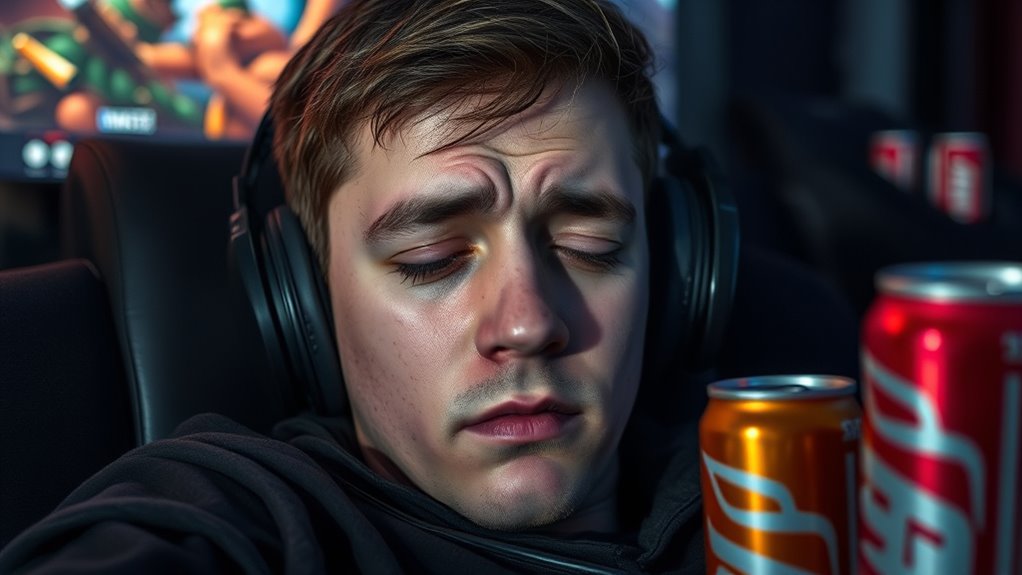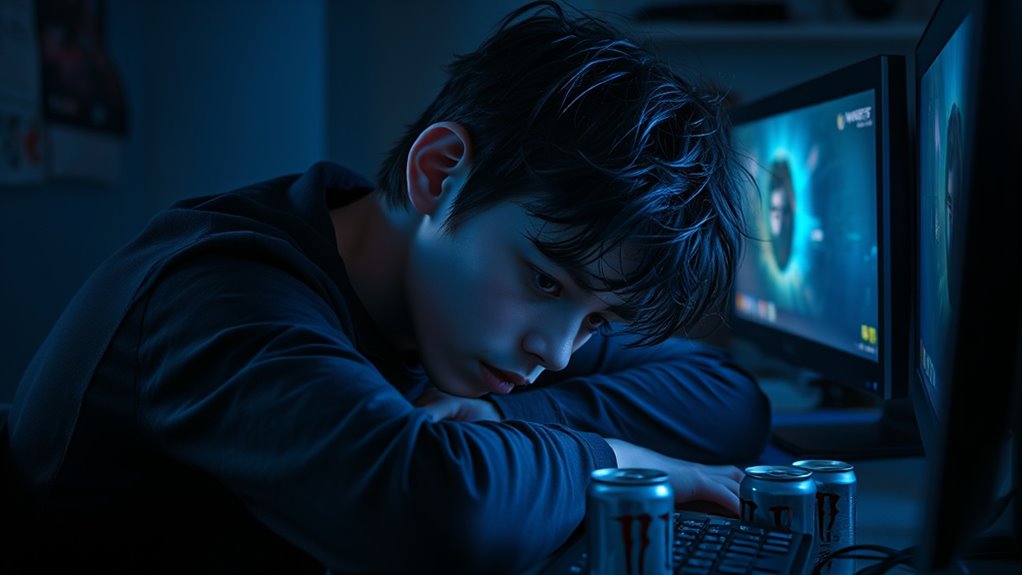Esports burnout is real and can seriously impact your performance and mental health. Performance coaches recommend recognizing early signs like exhaustion or frustration and taking proactive steps. Prioritize your mental well-being by setting boundaries, scheduling breaks, and practicing relaxation techniques. Incorporate rest days, get enough sleep, stay active outside gaming, and seek support when needed. Staying aware of these strategies can help you maintain long-term success—stay with us to explore more effective recovery tips.
Key Takeaways
- Early recognition of burnout symptoms like exhaustion and frustration is vital for effective intervention.
- Prioritize mental health by incorporating relaxation activities, regular breaks, and maintaining work-life balance.
- Implement recovery strategies such as rest days, quality sleep, and physical activity outside gaming sessions.
- Set clear boundaries on practice hours, communicate limits, and seek professional support when overwhelmed.
- Continuously evaluate mental health, celebrate progress, and use tools to support sustainable performance and well-being.

Esports burnout is a growing concern for players who dedicate countless hours to training and competition, often pushing their physical and mental limits. When you find yourself constantly racing against deadlines, grinding for victories, and striving for perfection, it’s easy to overlook the toll it takes on your mental health. Burnout doesn’t just affect your performance; it can lead to feelings of exhaustion, frustration, and disengagement. Recognizing the signs early is essential so you can implement effective recovery strategies and protect your well-being.
Esports burnout harms your performance and mental health—recognize early signs and prioritize recovery to stay resilient and focused.
One of the most important steps in combating esports burnout is prioritizing your mental health. It’s easy to become caught up in the competitive mindset, but neglecting your emotional and psychological needs can make burnout worse. You should make time for activities that relax and rejuvenate your mind, whether that’s meditation, deep breathing exercises, or simply taking breaks from screens. Maintaining a healthy work-life balance helps you stay grounded and reduces the risk of mental fatigue.
Recovery strategies are fundamental tools in your arsenal against burnout. Incorporate regular rest days into your training schedule, ensuring you’re allowing your mind and body to recover fully. Sleep plays a key role here—aim for consistent, quality sleep to help your brain process the stresses of gaming and restore your energy levels. Additionally, engaging in physical activity outside of gaming sessions can boost your mood and mental clarity. Even short walks or stretching routines can make a significant difference in how you feel.
Another effective recovery strategy involves setting boundaries. It’s tempting to keep practicing late into the night or respond to every message immediately, but overextending yourself only accelerates burnout. Establish clear limits on your practice hours and stick to them. Communicate these boundaries with your team or coach so everyone understands your needs. Furthermore, don’t hesitate to seek support from mental health professionals if feelings of anxiety, depression, or burnout become overwhelming. They can help you develop personalized coping techniques and provide a safe space to express your frustrations.
It’s also important to recognize that automation and technology can support your recovery by providing tools that help manage your schedule and monitor your mental health. Remember that recovery isn’t a one-time fix; it’s an ongoing process. Regularly evaluate how you’re feeling and adjust your routines accordingly. Celebrate small victories, and don’t be too hard on yourself when setbacks happen. By actively prioritizing your mental health and applying targeted recovery strategies, you can sustain your passion for esports while avoiding the destructive cycle of burnout. Ultimately, taking care of your mental well-being will help you perform at your best—not just today, but in the long run.
Frequently Asked Questions
How Can Players Identify Early Signs of Burnout?
You can spot early signs of burnout by paying attention to your mental health awareness. If you notice increased irritability, fatigue, or loss of motivation, it’s a sign to take a step back. Rely on peer support networks to share your feelings and gain perspective. Recognizing these signs early helps you address stress before it worsens, ensuring you stay healthy and maintain peak performance.
Are There Specific Dietary Adjustments to Prevent Burnout?
To prevent burnout, focus on your diet by optimizing meal timing and hydration strategies. Eat balanced meals at regular intervals to maintain energy levels and avoid crashes. Stay hydrated throughout your gaming sessions, as dehydration can lead to fatigue and decreased focus. Incorporate fruits, vegetables, and lean proteins into your meals, and drink plenty of water. These adjustments help sustain your mental clarity and physical stamina, keeping burnout at bay.
What Role Does Sleep Play in Recovery From Burnout?
Sleep plays a vital role in recovering from burnout by restoring your mental and physical health. Good sleep hygiene helps you fall asleep faster and stay asleep longer, supporting your circadian rhythm, which regulates your energy levels and mood. When you prioritize consistent sleep routines, you enhance your resilience and recovery, making it easier to bounce back from stress and fatigue. Sleep isn’t just rest; it’s your recovery powerhouse.
Can Burnout Impact Long-Term Career Prospects in Esports?
Imagine a fragile bridge strained by relentless storms—that’s your career in esports. Burnout weakens your mental resilience, making it harder to bounce back and risking long-term prospects. Without peer support, your foundation crumbles faster. If ignored, burnout can lead to early burnout, missed opportunities, and limited growth. Prioritizing mental resilience and nurturing peer support keeps your career sturdy, ensuring you stay strong through the storms and beyond.
How Do Cultural Differences Influence Burnout Management Strategies?
You should understand that cultural differences greatly influence burnout management strategies. Cross-cultural communication shapes how players perceive stress and seek support, while traditional healing practices can offer valuable coping mechanisms. By respecting diverse cultural backgrounds, you can develop tailored approaches that resonate more deeply, helping players manage burnout effectively. Embracing these cultural nuances fosters better understanding and resilience, ultimately supporting long-term well-being and career sustainability in esports.
Conclusion
Remember, even heroes like Achilles faced their own battles. Burnout can feel endless, but with the right strategies, you can rise stronger. Take a page from the wise and listen to your body and mind. Don’t let the flame of passion burn out before your time. Stay mindful, rest when needed, and keep your fire alive. After all, even legends know the importance of balance in the quest for greatness.










